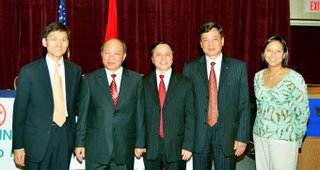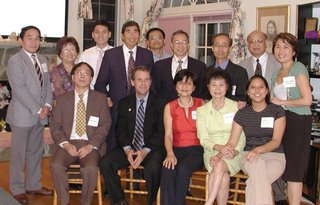In
this post by Mike Weston of the VN news aggregator blog
Chao Vietnam (which means "Hello, Viet-Nam" fwiw), he posts an article by
Tiền Phong that says Vietnam has one of the highest percentage of female legislators in Asia. It notes that "up to" 27.3 percent of "employees in legislative agencies" are females in Vietnam.
If taken at face value then there is a logical gap between the two sentences in the news article, after all "employees" are not exactly the same thing as legislators - for instance, there is a distinct difference between political staff and interns versus the elected or appointed legislator herself. Perhaps I'm reading the article too closely, so let me just assume that the article was loose with its language and indeed 27.3 percent of legislators in Vietnam are women.
27.3 percent is pretty stout and promising. In the U.S., according to information from
this Rutgers link, women hold about 15% of the seats in Congress (and 14% in the Senate specifically), about 23% in state legislatures and 25% in statewide elective executive offices (attorney generals, comptrollers and the like).
So based on these raw numbers, it looks like women have similar, if not greater, poltical clout in Vietnam as compared to the U.S., a result one would not casually imagine based upon assumptions about Asian countries and societies. I guess that's the problem with casually assuming.
Within the private sector, the article notes that more than 22 percent of executives are women. The article is brief, or rather, lacking, in describing its survey methods and definitions, so it is difficult to compare it to U.S. statistics. Even so, comparing that number to the percent of women holding positions on the board of Fortune 500 companies (14.7 percent in 2005, an improvement from 9.6 percent in 1995 - according to this
press release, summarizing a report conducted by
Catalyst, a leading research and advisory company focusing on women in the workplace issues), shows that Vietnam is far from trailing.
Indeed, in our visit there, we met with a Vietnamese female executive that heads one of the biggest enterprises in the entire country.
So what does all this have to do with us? Well, to move there, VA will need to resign from her job and postpone her career - she loves the sector in which she currently works and is on a nice, upwardly mobile track at her organization. To give it all up is asking a lot (by me). To give it all up to move somewhere as a
trailing spouse and be treated a bit like a second class citizen because she's a women would be a whole lot to take.
Maybe Vietnamese society is more egalitarian than we westerners give it credit for. The above stats help allay our concerns but our future experience will, in the end, determine how we perceive Vietnam on this metric.



